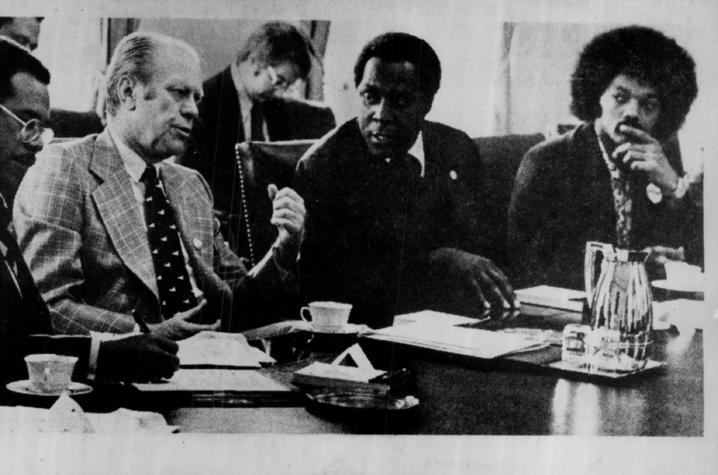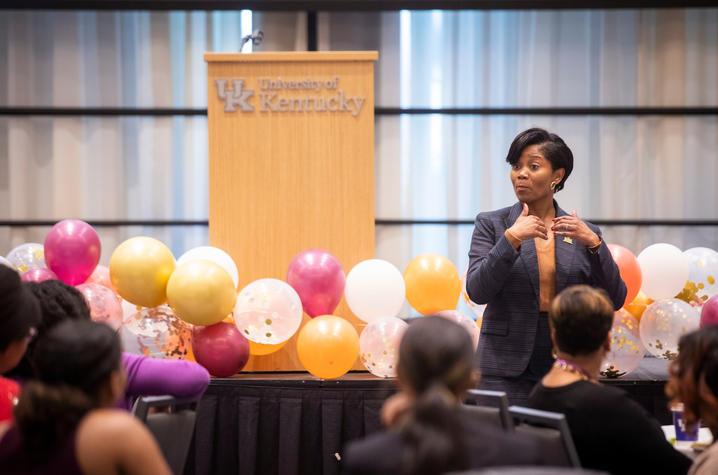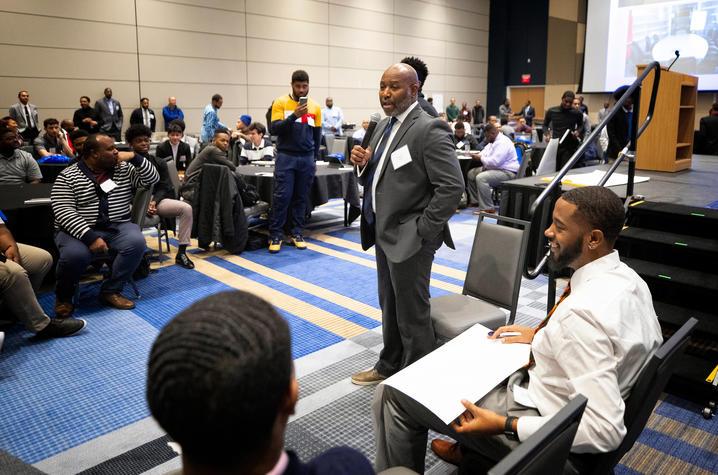By Ryan Girves

LEXINGTON, Ky. — Universities are where new discoveries are made, new understanding is reached and new ideas thrive. With that understanding, it is no surprise that Black History Month first began on a college campus.
While the first monthlong commemoration began in 1969 at Kent State University, the origins of Black History Month date back to 1915 with the founding of the Association for the Study of Negro Life and History (ASNLH), an organization dedicated to researching and promoting achievements by Black Americans and other peoples of African descent.
The group sponsored a national Negro History week in 1926, choosing the second week of February to coincide with the birthdays of Abraham Lincoln and Frederick Douglass. As the celebration grew traction, mayors of cities across the country began issuing yearly proclamations recognizing "Negro History Week." By the late 1960s, thanks in part to the civil rights movement and a growing awareness of Black identity, "Negro History Week" had evolved into Black History Month on many college campuses.
Then in 1976, President Gerald Ford officially recognized Black History Month, calling upon the public to “seize the opportunity to honor the too-often neglected accomplishments of Black Americans in every area of endeavor throughout our history.”
Today, Black History Month is a time to honor the contributions and legacy of Black Americans across U.S. history and society — from activists and civil rights pioneers to leaders in industry, politics, science and culture.
At the University of Kentucky, that sentiment holds true.

"Black History Month is a time to publicly honor the invaluable contributions of Black Americans. It is also a special time for each of us to focus on and challenge ourselves to growing our own Cultural Intelligence (CQ) — awareness, knowledge and action — toward bona fide inclusion," said UK Vice President for Institutional Diversity Katrice Albert. "For our campus, Black History Month is yet another opportunity to highlight and celebrate the remarkable people who help us fulfill our promise as Kentucky’s university."
In celebrating Black History Month, the university will host events on campus throughout February and create a number of series to continue the conversation around diversity, equity and inclusion (DEI).
Events include the following:
Martin Luther King Center
- MLK Center Living Legacy Awards Luncheon | 11 a.m.-1 p.m. Thursday, Feb. 2 | Harris Ballroom, Gatton Student Center
- Underground Perspective Formal hosted by Underground Perspective | 8-11 p.m. Sunday, Feb. 4 | Grand Ballroom, Gatton Student Center
- IMPACT Bible Study hosted by IMPACT Movement | 6 p.m. Feb. 6, 13, 20 and 27 | MLK Center, Gatton Student Center
- Sister Circle hosted by MLK Center and the Center for Graduate & Professional Diversity Initiatives | 4:30-6 p.m. Tuesday, Feb. 7 | Cat’s Den, Gatton Student Center
- Men of Color Symposium hosted by UK Office for Institutional Diversity (OID) | 8:30 a.m.-3 p.m. Friday, Feb. 10 (registration closes Feb. 6) | Harris Ballroom, Gatton Student Center
- Future Health Professionals Pre-Health Conference hosted by Hues in Medicine | 9 a.m.-3:30 p.m. Monday, Feb. 14 (registration closes Friday, Feb. 3) | Grand Ballroom, Gatton Student Center
- Plated Discussions hosted by MLK Center and Underground Perspective | 6-7 p.m. Thursday, Feb. 16 | Room 212, White Hall Classroom Building
- My Brother’s Keeper hosted by MLK Center and Center for Graduate & Professional Diversity Initiatives | 4:30-6 p.m. Tuesday, Feb. 21 | Cornerstone Esports Lounge
- Sister Circle hosted by MLK Center and Center for Graduate & Professional Diversity Initiatives | 4:30-6 p.m. Tuesday, Feb. 21 | MLK Center, Gatton Student Center
- Sister Circle Forum hosted by OID and Student Development & Support | 9 a.m.-5 p.m.Thursday, Feb. 23 | Harris Ballroom, Gatton Student Center
- Freedom Ball hosted by NAACP | 7 p.m. Saturday, Feb. 25 | Harris Ballroom, Gatton Student Center
- Tapas and Topics hosted by MLK Center | 4:30-6 p.m. Tuesday, Feb. 28 | MLK Center, Gatton Student Center
College of Arts and Sciences
- "Phillis Wheatley at 250: The Pasts and Futures of Reading and Writing #BlackJoy"
3 p.m. Friday, Feb. 3 | Grand Courtroom, J. David Rosenberg College of Law
Tara A. Bynum (University of Iowa), Brigitte Nicole Fielder (University of Wisconsin-Madison) and Cassander L. Smith (The University of Alabama) considers the legacy of Phillis Wheatley, the first Black woman to publish in the United States. Celebrating the 250 year anniversary of Wheatley’s poems, Bynum ("Reading Pleasures: Everyday Black Living in Early America"), Fielder ("Relative Races: Genealogies of Interracial Kinship in Nineteenth-Century America") and Smith ("Black Africans in the British Imagination: English Narratives of the Early Atlantic") also explore what her history means for the future of African American and American studies. Co-sponsored by the Commonwealth Institute for Black Studies. - "Political Black Girl Magic: The Elections and Governance of Black Female Mayors"
3 p.m. Thursday, Feb. 9, and 12:40 p.m. Friday, Feb. 10 | Alumni Gallery, William T. Young Library
Sharon Austin, professor of political science at the University of Florida, will give a lecture on voting rights. Co-sponsored by the Commonwealth Institute for Black Studies. - “We, Too, Were Here!” with Sharyn Mitchell
3 p.m. Wednesday, Feb. 15 | UK Athletics Auditorium, William T. Young Library
Guest speaker Sharyn Mitchell will discuss how archives and historical repositories have been silent or silenced by omission or commission and fail to speak of the presence, accomplishments and contributions Black Americans have made to Kentucky history. Mitchell believes there are two sides to every story and that from an African proverb we learn that until the lion tells her story, the hunter always wins. Co-sponsored by the UK Appalachian Center and Appalachian Studies program, Department of African American and Africana Studies, the Commonwealth Institute for Black Studies and UK Libraries.
College of Agriculture, Food and Environment
- Alicestyne Turley, author of "The Gospel of Freedom: Black Evangelicals and the Underground Railroad"
6 p.m. Thursday, Feb. 23 | Fayette County Extension Office (register online)
As part of Fayette County Extension's "Kentucky Proud Evenings" series, Turley will present an evocative exploration of the Underground Railroad and the important contributions of white and Black antislavery southerners who united to form organized networks of assisted slave escapes in Kentucky and the Deep South. - A Night of Black Excellence
6-7:30 p.m. Thursday, Feb. 9 (register by Feb. 6) | Fayette County Extension Office
Fayette County Extension's "night honoring Black food, agriculture, entertainment and African Americans in the Extension and family consumer science field."
College of Education
- "Let The Little Light Shine" Film Screening and Q & A
6 p.m. Wedensday, Feb. 8 | Taylor Education Building auditorium
Attend a free screening of the film “Let the Little Light Shine." Directed by Kevin Shaw, the film explores what happens when a top-ranked elementary school is threatened to be replaced by a new high school favoring the communities wealthier residents. Students, teachers, parents and community members band together to fight for the elementary school's survival. A virtual question and answer session with the director will take place following the documentary.

While February is a time to reflect on the past, it’s also a springboard to the future when it comes to DEI initiatives at UK. “Behind the Blue,” a weekly podcast created by UK’s Offices of Public Relations and Strategic Communications and Marketing and Brand Strategy, will kick off a regular series that will showcase the people across campus who are leading the way on the university’s Diversity, Equity and Inclusion Implementation Plan. This month, the series will begin with an overview of the projects with Katrice Albert, UK vice president for institutional diversity. "Behind the Blue" will then feature regular interviews throughout the next year with project leads to provide a more in-depth and personal perspective of this important work.
“Black history is our collective history, and it’s important to engage with our past as we raise our expectations for the future,” Albert said. “I look forward to celebrating Black excellence at UK with our entire community.”
To further commemorate Black History Month, throughout February, UK’s social media channels will feature Black students, faculty, staff and alumni who have shared their stories of what Black History Month means to them and why it is important. Follow along on Facebook, Twitter and Instagram, and on digital signage across campus.
For more information on the university's diversity, equity and inclusion efforts, visit the DEI website. The DEI website is home to information about DEI-related resources available to faculty, staff and students; events and organizations; news and campus messages; and updates on DEI efforts around campus.
As the state’s flagship, land-grant institution, the University of Kentucky exists to advance the Commonwealth. We do that by preparing the next generation of leaders — placing students at the heart of everything we do — and transforming the lives of Kentuckians through education, research and creative work, service and health care. We pride ourselves on being a catalyst for breakthroughs and a force for healing, a place where ingenuity unfolds. It's all made possible by our people — visionaries, disruptors and pioneers — who make up 200 academic programs, a $501 million research and development enterprise and a world-class medical center, all on one campus.
In 2022, UK was ranked by Forbes as one of the “Best Employers for New Grads” and named a “Diversity Champion” by INSIGHT into Diversity, a testament to our commitment to advance Kentucky and create a community of belonging for everyone. While our mission looks different in many ways than it did in 1865, the vision of service to our Commonwealth and the world remains the same. We are the University for Kentucky.
